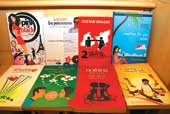 |
| Author Ashna Sen at the book launch at Oxford. (Rashbehari Das) |
The fortuitous discovery of a letter from Sir Stafford Cripps to the author’s grandmother led to the writing of The Rusted Trunk, A Historical Memoir of ICS officers in the British Raj. The book, according to Hari Vasudevan, who launched it at the Oxford Bookstore on Saturday, is “a memoir that is unusual”. Based on sources like letters and diaries, The Rusted Trunk is a deeply personal account, peppered with anecdotes about the society from 1899 to 1965.
Author Ashna Sen, a math professor, who likens herself to Charles Lutwidge Dodgson, alias Lewis Caroll, a mathematics wizard who authored Alice in Wonderland, said, “the book was a bit of a surprise”. After discovering Cripps’ letter, she came across more such personal letters from Subhash Chandra Bose, Tagore and Jinnah.
“I accidentally found something very significant and didn’t know what to do with these,” said the professor. So she set herself to write this semi-biographical work that covers the periods of modern Indian history from the British Raj to post-Independence India. In that sense, Vasudevan calls it a “story of freedom struggle”.
The Rusted Trunk, published by the Writers Workshop, primarily projects the life and times of Syed Manzur Murshed, Sen’s maternal grandfather. It emphasises historical facts, hitherto unknown. Murshed finds himself in the midst of key political events and history in the making. His marriage to the daughter of the Nawab of Dacca is arranged by his family. He closely follows the political activities of his uncle AK Fazlul Huq, who later becomes the Prime Minister of undivided Bengal in 1937.
Murshed’s marriage to Hasina, after the death of his first wife, forms the basis of a moving love story narrated with immense care.
Hasina, who emerges from purdah to become the first woman parliamentary secretary in pre-Partition Bengal, finds herself in the midst of civil servants as a result of her husband’s career and proceeds to educate herself. She becomes a pioneer of women’s education and founds Lady Brabourne College, the first college for Muslim women in Bengal in 1939.

